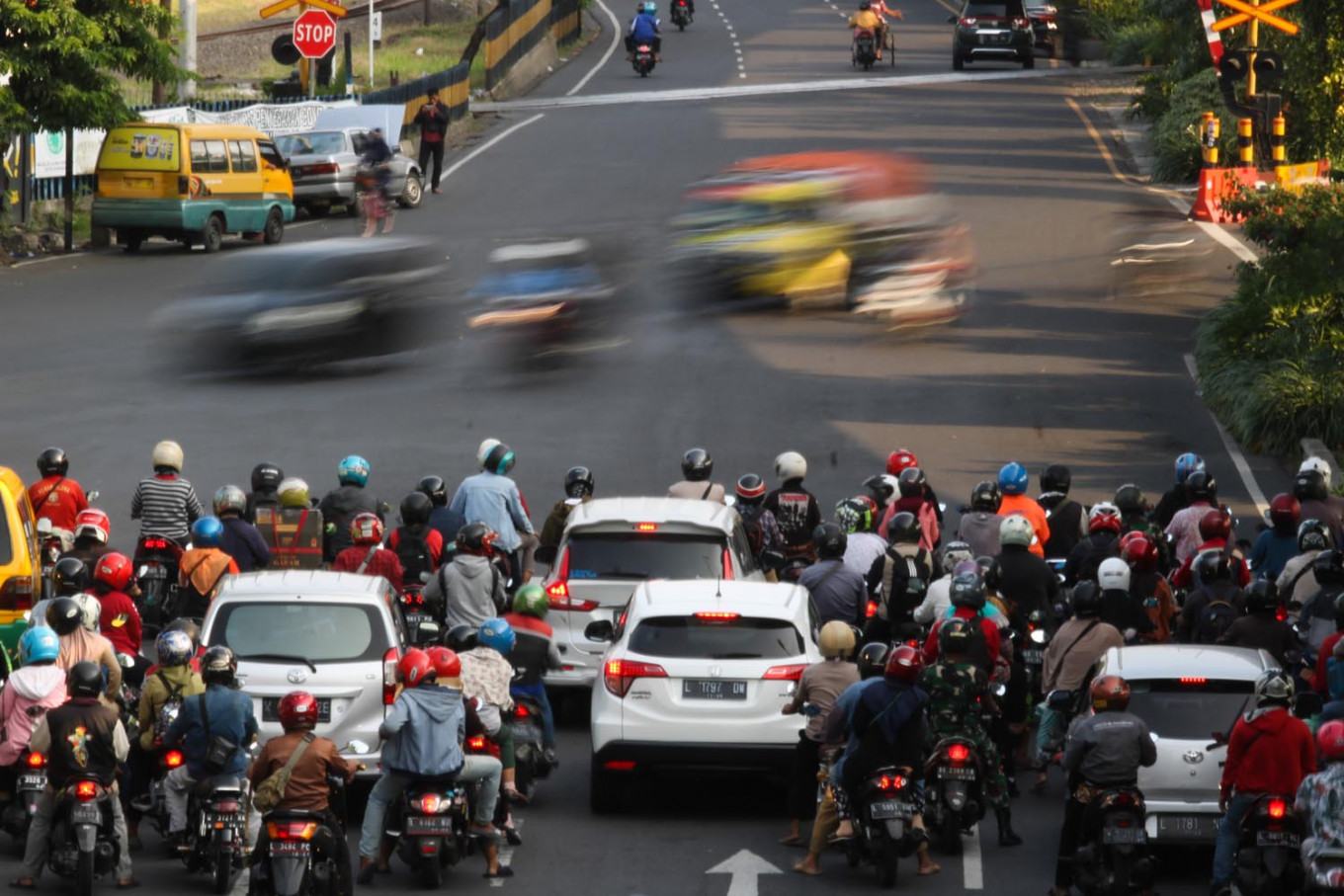Popular Reads
Top Results
Can't find what you're looking for?
View all search resultsPopular Reads
Top Results
Can't find what you're looking for?
View all search resultsSurabaya urged to reimpose PSBB as infection rates soar
The number of confirmed COVID-19 cases in Surabaya, East Java, has continued to spike after large-scale social restrictions (PSBB) were lifted, leading to calls for the partial lockdown to be reimposed.
Change text size
Gift Premium Articles
to Anyone
The number of confirmed COVID-19 cases in Surabaya, East Java, has continued to spike after large-scale social restrictions (PSBB) were lifted, leading to calls for the partial lockdown to be reimposed.
Home to some 2.8 million people, the second-largest city in Indonesia accounts for half of the total cases in East Java, the province that has replaced Jakarta as the country’s new COVID-19 epicenter since May 21.
However, Greater Surabaya, which consists of Surabaya and its satellites cities Sidoarjo and Gresik, decided to end its PSBB measures on June 8.
The East Java COVID-19 task force reported that post-PSBB, the COVID-19 attack and transmission rates in Surabaya have soared, in line with a lack of awareness among Surabaya residents of the importance of complying with health protocols.
The attack rate is defined by the percentage of the population that contracts the disease during a specified time interval, while the transmission rate (RT) represents the average number of people who are infected by an infectious person.
In Surabaya, the attack rate of COVID-19 has reached 139.7, meaning 140 in every 100,000 people is COVID-19 positive. This is the highest rate in the country. Meanwhile, the overall attack rate in East Java is 19.7.
The transmission rate of COVID-19 in Surabaya is currently 1.2, compared with East Java’s 1.1.
The task force also reported that community compliance with health protocols in Greater Surabaya had declined, with the poorest compliance occurring in outdoor exercise spaces, followed by offices and factories, places of worship and traditional markets.
“This is disappointing. Theoretically, under these conditions, we should revive the lockdown, or for us, the PSBB,” the task force’s curative management head Joni Wahyuhadi said on Wednesday, as quoted by kompas.com.
Joni added that the transmission rates had fallen to 0.5 in Surabaya and 0.86 in East Java during the PSBB period, stressing that such measures had proven effective in curbing the spread of COVID-19.
Echoing Joni’s statement, East Java Governor Khofifah Indar Parawansa also said the transmission rates in Surabaya and its satellite cities had fallen to below 1.0 during the PSBB period.
“From June 21 to 26, Surabaya’s RT was below 1.0. Then, in Sidoarjo, for eight days from June 20 to 27, the rate was under 1.0. Gresik also had a rate under 1.0 for six consecutive days,” she said.
As East Java had failed to maintain a transmission rate below 1.0 for 14 consecutive days, Khofifah said, the province was not yet ready to enter the so-called “new normal” phase.
Greater Surabaya’s PSBB period lasted from April 28 to June 8, with two extensions. Despite having the partial lockdown in place, Surabaya was categorized as a “black zone” on June 3 due to its skyrocketing number of confirmed COVID-19 cases.
Surabaya Mayor Tri Rismaharini, who faces the burden of economic pressures, proposed terminating the PSBB measures to Governor Khofifah during an evaluation meeting earlier this month, arguing that many people had been forced to remain idle for too long.
Unlike Jakarta, which is now transitioning to the new normal with the PSBB measures still in place, Surabaya removed the PSBB measures completely and is now implementing its own health protocols and relying heavily on the self-compliance of the community.
Over the past month, East Java has consistently reported the highest number of new cases in the country. On Thursday, the province recorded 384 new cases, taking its overall tally to 8,917 cases and 664 deaths, according to the Health Ministry.
According to the Surabaya administration, the city had recorded a total of 4,262 cases and 333 deaths as of Wednesday. The city has recorded an average of 100 new cases per day since the PSBB measures were revoked.
Despite East Java’s occasional claims that the soaring number of cases are a result of the province’s increased testing capacity, the World Health Organization has reported that the province has a remarkably high positivity rate in testing.
In its latest weekly situational report, the WHO reported that the positivity rate in East Java over the last two weeks was 31.6, far from the WHO’s provision of below 5.0 to impose new normal measures. None of the provinces assessed met this requirement.
The East Java administration and the Surabaya administration are split on whether to revive the PSBB measures, with Surabaya insisting on “continuing to run the wheels of the people’s economy”.
Experts have expressed dismay over Surabaya’s decision to ease the restrictions when conditions were not safe, fearing that without immediate controls, it could lead to an overwhelming of the healthcare system and resources.
“Surabaya shouldn’t work alone. It must gather health experts to assess how significantly the impacts have been from easing the PSBB measures,” dean of the University of Indonesia’s School of Medicine, Ari Fahrial Syam, told The Jakarta Post on Thursday.










